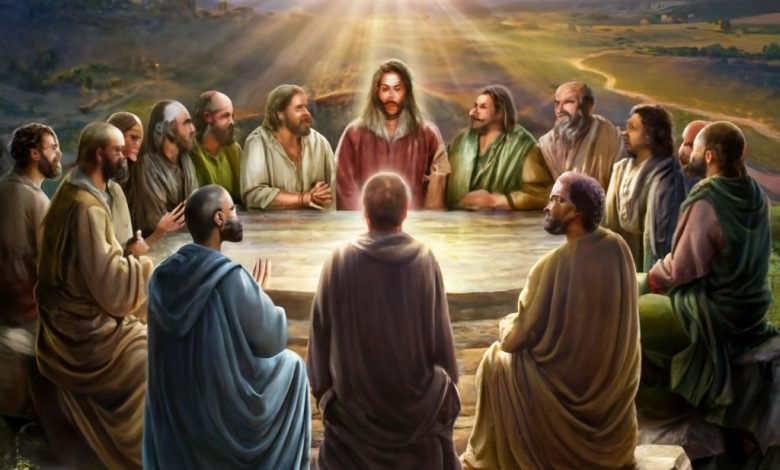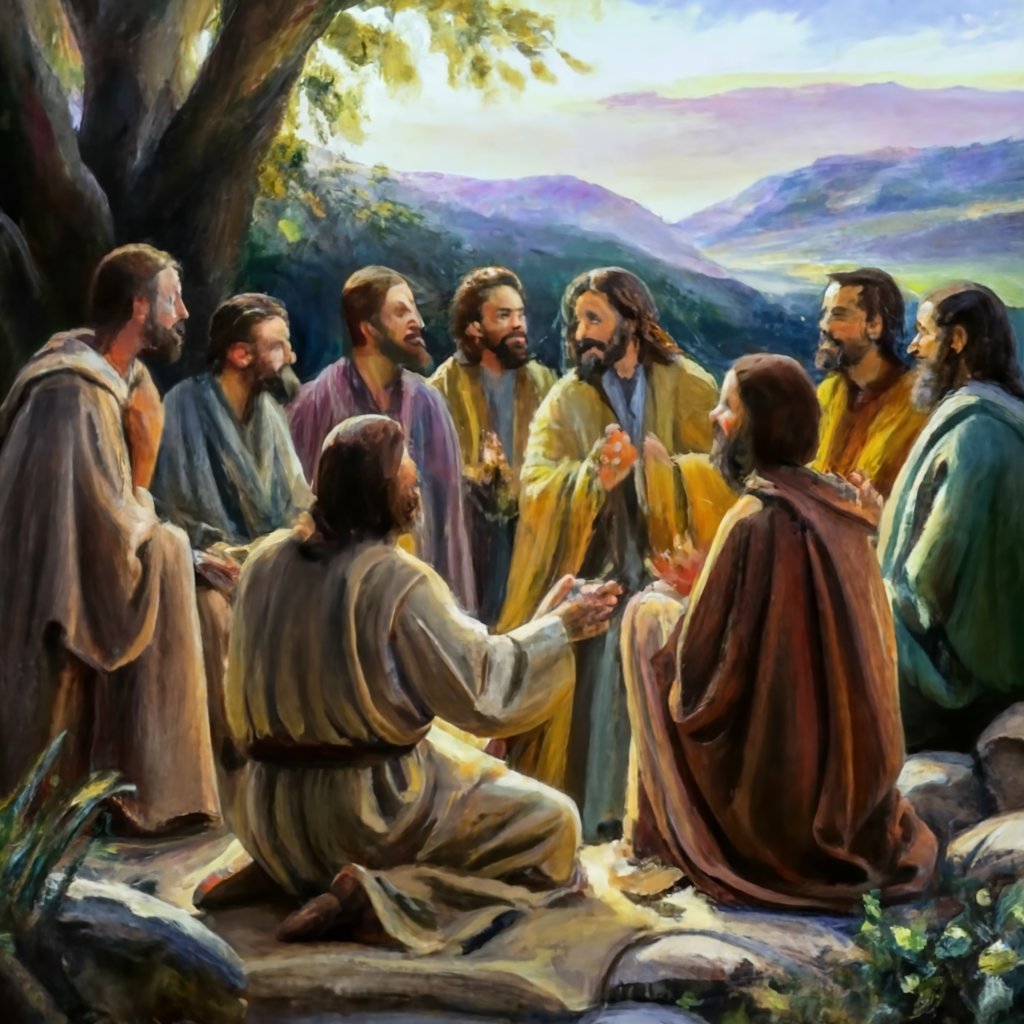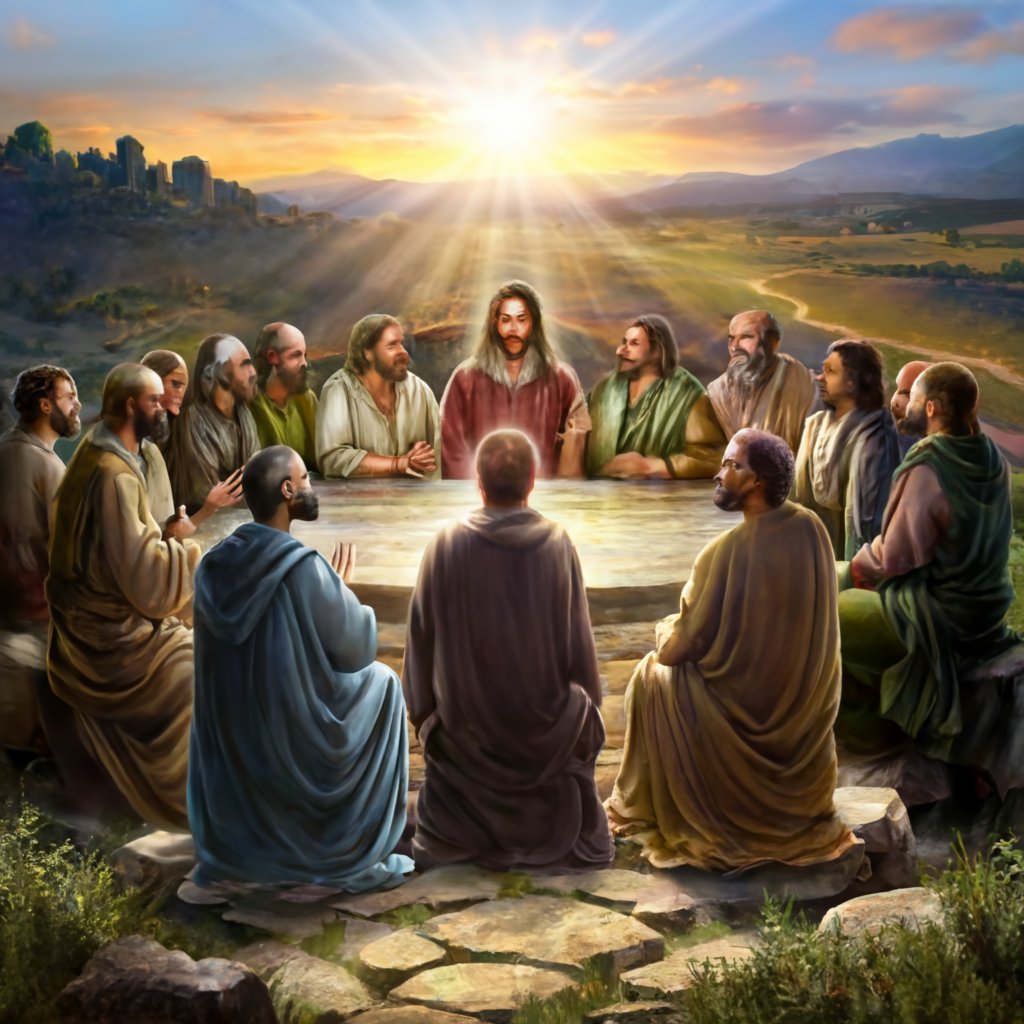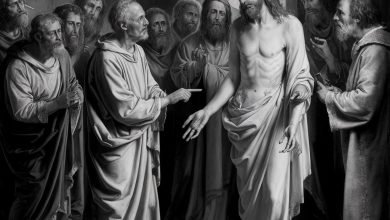
Fate of the Twelve Apostles and Disciples of Jesus Christ
Read how each of the apostles traveled to different lands to preach and spread Christianity, and how some of them were martyred for their faith.
The Gospel states that the early apostles of Jesus Christ were Peter, Andrew, John, James son of Zebedee, Philip, Bartholomew, Thomas, Matthew, James son of Alphaeus, Thaddaeus, Simon the Zealot, and Judas Iscariot. Judas betrayed Jesus, leading to his arrest and eventual crucifixion. Judas later took his own life and was replaced by Matthias.
The Principal Apostles
The twelve principal apostles of Jesus are listed as follows: First, Simon called Peter, and his brother Andrew; James son of Zebedee, and his brother John; Philip and Bartholomew; Thomas and Matthew the tax collector; James son of Alphaeus, and Thaddaeus; Simon the Zealot, and Judas Iscariot who betrayed Him. (Matthew 10:2-4)
Matthias Chosen to Replace Judas
“Therefore, it is necessary to choose one of the men who have been with us the whole time the Lord Jesus went in and out among us, beginning from John’s baptism to the time when Jesus was taken up from us. For one of these must become a witness with us of His resurrection.”
So they nominated two men: Joseph called Barsabbas (also known as Justus) and Matthias. Then they prayed, “Lord, you know everyone’s heart. Show us which of these two you have chosen to take over this apostolic ministry, which Judas left to go where he belongs.” Then they cast lots, and the lot fell to Matthias; so he was added to the eleven apostles. (Acts 1:21-26)
Perhaps the group Jesus chose to deliver His message to the world was not what you might expect. There was nothing extraordinary or outstanding about them. The twelve apostles were just ordinary working men. But Jesus turned them into the backbone of the church and entrusted them with the most remarkable task imaginable: calling the entire world, including the most powerful known empire, to repent and believe in the resurrected Christ. Any educated Roman citizen in the first century would have laughed at any prediction that Christianity would become the official religion of the empire within three centuries.
Read more : Who was Simon the zealot and what was his role in the Bible?

Read more: Who was Simon the Zealot and what was his role in the Bible?
The Apostles of Jesus
Dispersal of the Twelve Apostles
In his third book of “Church History,” Eusebius, a third-century historian, outlines the missionary destinations of Jesus’ apostles as follows:
In the meantime, the holy apostles and disciples of our Savior were dispersed throughout the world. According to tradition, Thomas received Parthia (an area east of Iran), Andrew received Scythia (an area north of the Black Sea), and John received Asia (an area in western Asia Minor), where he remained until his death in Ephesus.
Peter appears to have preached to the dispersed Jews in Pontus, Galatia, Bithynia, Cappadocia, and Asia. Eventually, after coming to Rome, he was crucified upside down at his own request. As for Paul, who spread the Gospel of Christ from Jerusalem to Illyricum (an area west of the Balkans), and was later martyred in Rome under Nero’s command, what need is there to speak? These facts were recorded by Origen in the third book of his Commentary on Genesis.
Many are curious about how the apostles died, but the New Testament only records the fate of two of them: Judas, who betrayed Jesus and then hanged himself, and James son of Zebedee, who was executed by Herod around 44 AD (Acts 12:2). This text explores how each of the apostles traveled for preaching and how many of them died for their faith.
How Did the Apostles Die?
There are numerous accounts and legends regarding the fate of the apostles, though not all are reliable. However, it is certain that as pioneers of the message of the resurrected Christ, the apostles traveled far and wide. An old legend says they cast lots to determine their missionary destinations so that everyone could hear Jesus’ message. The apostles endured many hardships for their faith and were often violently martyred due to their bold testimony and steadfast belief in Christ.
Lives and Deaths of the Apostles
A look at what we know about the lives and deaths of each apostle:
Peter
The life of the apostle Peter holds a significant place in Christian history. Initially called Simon, he was a humble fisherman from Bethsaida who was chosen by Jesus to be one of His twelve apostles. Known for his fervent faith and leadership, Peter often took a forefront role among the apostles, eager to follow and serve the Lord. His journey with Jesus was marked by profound moments of faith, such as when he walked on water at Jesus’ command, demonstrating his willingness to trust and obey.
Peter’s life was profoundly influenced by his relationship with Jesus. Despite his human weaknesses, like his impulsiveness and his denial of Christ during the crucifixion, Peter’s story is one of redemption and grace. Jesus’ forgiveness and restoration of Peter after the resurrection exemplify the depth of God’s mercy and the power of repentance. Peter’s leadership in the early church, especially his bold proclamation of the Gospel on Pentecost, continues to inspire evangelism and spiritual leadership. His legacy still encourages Christians to live with courage and faith in their walk with God.
Paul
The apostle Paul, initially known as Saul of Tarsus, was a prominent figure in the early Christian church and its expansion. Born in Tarsus, located in present-day Turkey, Paul was a well-educated Pharisee and Roman citizen, giving him a unique perspective and access for his missionary work.
His life changed dramatically on the road to Damascus, where he had a profound conversion experience. Struck blind by a heavenly light, he encountered the resurrected Christ and transformed from a persecutor of Christians to a devoted follower of Jesus. This pivotal event marked the beginning of his mission to spread the Gospel to the Gentiles (non-Jews), making him one of the most influential apostles in Christian history.
Paul’s missionary journeys took him across the Roman Empire, establishing several churches and writing numerous letters, many of which are now part of the New Testament. His epistles, including Romans, Corinthians, and Galatians, addressed theological issues, provided guidance for Christian living, and encouraged unity in the early church.
Paul’s teachings on salvation through faith in Christ, the nature of the church as the body of Christ, and the role of the Holy Spirit have left a lasting impact on Christian theology. Despite facing persecution, imprisonment, and various hardships, Paul remained steadfast in his mission. His legacy continues to inspire Christians worldwide, as his writings and example of faithfulness remain central to Christian beliefs and practices.
Both Peter and Paul were martyred in Rome around 66 AD, during the persecution of Christians by Emperor Nero. Paul was beheaded, and Peter was crucified upside down at his own request, as he felt unworthy to die in the same manner as his Lord.
Andrew
The apostle Andrew was Peter’s brother. Born in Bethsaida, a town by the Sea of Galilee, he initially worked as a fisherman alongside his brother Peter. His life took a significant turn when he encountered John the Baptist and then met Jesus, whom he recognized as the Messiah. Andrew is known as the first disciple to follow Jesus and did not hesitate to share this discovery with his brother, bringing Peter into Jesus’ circle of followers.
During his time with Jesus, Andrew is depicted as a dedicated and humble follower, often seen in the background but always present at key moments of Jesus’ ministry. One notable example of his faith is recorded in the Gospel of John, where Andrew brings a boy with five loaves and two fish to Jesus, who miraculously multiplies them to feed five thousand people.
After Jesus’ resurrection and ascension, Andrew is believed to have embarked on missionary journeys to spread the Gospel. According to tradition, he preached in regions such as Scythia (an area north of the Black Sea), Greece, and Asia Minor. Early Christian writings suggest that Andrew was martyred in Patras, Greece, where he was crucified on an X-shaped cross, now known as St. Andrew’s Cross. His legacy as the patron saint of several countries, including Scotland, Russia, and Greece, continues, and his life inspires Christians to share their faith with others.

Thomas
Thomas, often remembered for his doubt and known as “Doubting Thomas,” was one of the apostles chosen by Jesus to accompany and spread His teachings. He is mentioned several times in the Gospels, where he is portrayed as a loyal and inquisitive follower of Christ.
His most famous moment of doubt occurred after Jesus’ resurrection, when he declared that he would not believe in the risen Christ until he saw and touched His wounds. This moment of skepticism turned into a powerful testimony of faith when Jesus appeared to Thomas and invited him to touch His wounds, leading Thomas to exclaim, “My Lord and my God!”
Beyond this well-known incident, Thomas’ life after Jesus’ resurrection is shrouded in mystery and legend. Early Christian tradition suggests that Thomas traveled eastward to spread the Gospel, possibly reaching as far as India. He is credited with establishing Christian communities and performing miracles in the name of Jesus. His missionary efforts in India, in particular, are highly revered, and he is regarded as the apostle who brought Christianity to the Indian subcontinent.
It is believed that Thomas was martyred for his faith, with various accounts suggesting he was either stabbed or stoned to death. His relics are venerated in several churches worldwide, and his journey from doubt to faith continues to resonate with many Christians, reminding them of the importance of questioning and seeking the truth in their spiritual journeys.
Philip
The apostle Philip is known for his role in the early Christian church and his close relationship with Jesus. Born in Bethsaida, the same town as Peter and Andrew, Philip was one of the first disciples called by Jesus. He is often depicted in the Gospels as a practical and thoughtful follower, who played a significant role in connecting others to Jesus.
One notable instance of Philip’s faith is recorded in the Gospel of John, where he introduces Nathanael to Jesus, leading to Nathanael’s belief in Christ. Philip’s encounter with the Ethiopian eunuch, as described in the Book of Acts, highlights his dedication to spreading the Gospel. Guided by the Holy Spirit, Philip approached the eunuch’s chariot, explained the Scriptures, and baptized him, marking a significant moment in the spread of Christianity beyond the Jewish community.
Philip’s missionary journeys took him to various regions, including Asia Minor, where he preached the Gospel and performed miracles. Early Christian tradition holds that Philip was martyred for his faith, with accounts suggesting he was crucified or beheaded. Despite the uncertainty surrounding the exact details of his death, Philip’s unwavering commitment to Christ and his role in spreading the Gospel remain influential. His legacy inspires Christians to share their faith and serve others with humility and dedication.
Bartholomew
The apostle Bartholomew, also known as Nathanael, was one of the twelve apostles chosen by Jesus. Hailing from Cana in Galilee, Bartholomew is best known for his initial encounter with Jesus, where Jesus described him as “an Israelite indeed, in whom is no deceit.” This encounter, recorded in the Gospel of John, highlights Bartholomew’s sincerity and openness to the truth.
During his time with Jesus, Bartholomew witnessed many of His miracles and teachings, which deepened his faith and commitment to the Gospel. After Jesus’ resurrection and ascension, Bartholomew is believed to have embarked on missionary journeys to spread the Christian message. According to tradition, he traveled to various regions, including India, Armenia, and possibly even Ethiopia and Southern Arabia.
Bartholomew’s missionary efforts were marked by his dedication to preaching and performing miracles in the name of Jesus. Early Christian writings suggest that he faced opposition and persecution for his faith, ultimately leading to his martyrdom. Accounts of his death vary, with some traditions claiming he was flayed alive and then beheaded.
Matthew
The apostle Matthew, also known as Levi, was a tax collector before being called by Jesus to follow Him. His background as a tax collector is significant because tax collectors were often despised by their fellow Jews for collaborating with the Roman authorities and engaging in corrupt practices. Matthew’s decision to leave his lucrative profession and follow Jesus demonstrates a profound transformation and commitment to the Gospel.
As an apostle, Matthew witnessed Jesus’ teachings, miracles, and ministry firsthand. He is traditionally credited with writing the Gospel of Matthew, which presents a detailed account of Jesus’ life, teachings, death, and resurrection. This Gospel, written primarily for a Jewish audience, emphasizes Jesus as the fulfillment of Old Testament prophecies and the promised Messiah.
After Jesus’ resurrection and ascension, Matthew is believed to have traveled to various regions to spread the Gospel. Early Christian tradition suggests that he preached in areas such as Ethiopia, Persia, and possibly even Parthia. Despite the challenges and dangers he faced, Matthew remained steadfast in his mission to share the message of Jesus.
James the Less
James the Less, also known as James son of Alphaeus, was one of the twelve apostles chosen by Jesus. He is called “the Less” to distinguish him from James the son of Zebedee, another apostle. The name “the Less” could refer to his younger age or smaller stature. Little is known about James the Less, as he is mentioned only a few times in the New Testament, primarily in lists of the apostles.
Despite the limited information, James the Less played a significant role in the early Christian church. As one of the twelve apostles, he witnessed Jesus’ teachings, miracles, death, and resurrection. After Jesus’ ascension, James the Less continued to spread the Gospel and support the growing Christian community.
Early Christian tradition suggests that James the Less may have traveled to various regions to preach the Gospel. Some accounts indicate that he was martyred for his faith, possibly by stoning or crucifixion. His legacy, though not as well-documented as some of the other apostles, reflects his dedication to Christ and the early Christian movement.

Jude Thaddeus
Jude Thaddeus, also known as Jude or Thaddeus, was one of the twelve apostles chosen by Jesus. He is sometimes referred to as Jude of James or Judas son of James, to distinguish him from Judas Iscariot, the apostle who betrayed Jesus. Jude Thaddeus is known for his passionate commitment to spreading the Gospel and his role in the early Christian church.
Jude Thaddeus is traditionally credited with writing the Epistle of Jude, a brief letter in the New Testament that addresses issues of false teachings and encourages believers to remain steadfast in their faith. His writings emphasize the importance of defending the faith and living a life that reflects the teachings of Jesus.
After Jesus’ resurrection and ascension, Jude Thaddeus is believed to have traveled to various regions to preach the Gospel. Early Christian tradition suggests that he may have journeyed to areas such as Mesopotamia, Armenia, and Persia, where he spread the message of Christ and performed miracles.
Simon the Zealot
Simon the Zealot, also known as Simon the Canaanite or Simon the Cananaean, was one of the twelve apostles chosen by Jesus. The term “Zealot” suggests that Simon may have been part of a Jewish political movement that sought to overthrow Roman rule in Judea. His background as a Zealot highlights the diversity among Jesus’ apostles, who came from various walks of life and held different political and social views.
As an apostle, Simon the Zealot witnessed Jesus’ teachings, miracles, death, and resurrection. His transformation from a political revolutionary to a devoted follower of Christ exemplifies the transformative power of Jesus’ message.
After Jesus’ resurrection and ascension, Simon the Zealot is believed to have embarked on missionary journeys to spread the Gospel. Early Christian tradition suggests that he traveled to regions such as Egypt, North Africa, and possibly even Britain. Despite the challenges and dangers he faced, Simon the Zealot remained committed to his mission.
Judas Iscariot
Judas Iscariot is one of the most infamous figures in the New Testament, known for his betrayal of Jesus. He was one of the twelve apostles chosen by Jesus, but his actions ultimately led to Jesus’ arrest and crucifixion. Judas Iscariot’s betrayal is a pivotal event in the Christian narrative, highlighting themes of loyalty, betrayal, and the consequences of one’s actions.
As an apostle, Judas Iscariot witnessed Jesus’ teachings, miracles, and ministry. However, he became disillusioned or motivated by greed, leading him to betray Jesus for thirty pieces of silver. This act of betrayal fulfilled Old Testament prophecies and set in motion the events leading to Jesus’ crucifixion.
After betraying Jesus, Judas Iscariot was overcome with remorse and guilt. According to the New Testament, he attempted to return the money he received for his betrayal and ultimately took his own life. His tragic end serves as a cautionary tale about the dangers of greed and the importance of faithfulness.
Matthias
Matthias was chosen to replace Judas Iscariot after his betrayal and subsequent death. The selection of Matthias is recorded in the Book of Acts, where the apostles cast lots to determine who would take Judas’ place. Matthias was chosen because he had been with Jesus and the other apostles throughout Jesus’ ministry, from His baptism by John to His ascension.
As one of the twelve apostles, Matthias witnessed Jesus’ teachings, miracles, death, and resurrection. After being chosen as an apostle, Matthias continued to spread the Gospel and support the early Christian church. Early Christian tradition suggests that he may have traveled to various regions to preach, including Judea, Cappadocia, and possibly Ethiopia.
Though little is known about Matthias’ life and missionary work, his selection as an apostle underscores the importance of faithfulness and continuity in the early Christian community. His legacy reflects the dedication and commitment of the apostles to spreading the message of Jesus.
In conclusion, each of the twelve apostles played a vital role in spreading the message of Jesus and establishing the early Christian church. Their journeys, teachings, and sacrifices continue to inspire Christians worldwide, reminding them of the importance of faith, dedication, and the transformative power of the Gospel.





